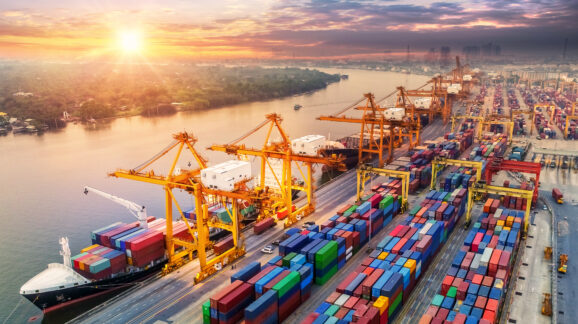The next president may face a ‘January Surprise’: Port strikes

Photo Credit: Getty
The next president might face a test right as they are being inaugurated: a renewal of the International Longshoremen Association’s (ILA) strike against east coast and Gulf of Mexico ports. The union has set a deadline of Jan. 15 to resolves its outstanding issues with the United States Maritime Alliance (USMA), which represents the various port companies. The date for the presidential inauguration is Jan. 20.
Of course, who that president will be remains a tossup at the time of this post. The conventional wisdom, laid out in a recent Wall Street Journal story, is that the unions want it to be Democratic nominee Kamala Harris, who has the most labor endorsements, and that the ports would prefer Republican nominee and former businessman Donald Trump. There’s ample reason to think that conventional wisdom might be wrong, however, and that both candidates will lean towards the unions.
Either way, the talks are likely to be highly contentious. Pay isn’t the issue. There’s a whopping 62 percent pay increase for the ILA already on the table. The issue is that the union wants no further automation of the ports. That’s not reasonable. US ports are already far behind the international standard for automation.
CEI has proposed a way to avoid these potential crises in the future: put the ports under the authority of the Railway Labor Act (RLA), as opposed to the National Labor Relations Act’s (NLRA), the law that currently covers them. The RLA gives the president and Congress the power to step in and force a contract. That type of intervention isn’t ideal, but the threat of it will likely force both the union and management to reach a deal quicker.
Congress would have to amend the RLA to make that happen and it isn’t likely to get around to it in time to prevent another walkout by the ILA before January.
A prospective Harris administration would be in a bind. Their inclination may be to back the union, but allowing the ports to shut down, even briefly, would hurt the national economy, creating a very bad first impression for the incoming president. Nevertheless, during the initial walkout in October, President Biden ruled out using the NLRA’s provision that allows him to force an 80-day cooling-off period. Harris might be more open to that but given that the union has already pushed back negotiations once, they’re not likely to be happy with yet another delay.
Harris has usually sided with unions throughout her career, sometimes bending the law to do so, but she has had little direct experience with labor contract negotiations. In all likelihood, the administration’s point person for the talks will be acting Labor Secretary Julie Su.
Another important factor is that many of the companies that represent US ports are foreign-owned, Both Harris and Trump have used that to portray them as them the bad guys in the dispute. “Foreign-owned shipping companies have made record profits and executive compensation has grown,” Harris said in October.
Trump also appeared to side with the dockworkers back in October. “American workers should be able to negotiate for better wages, especially since the shipping companies are mostly foreign flag vessels, including the largest consortium ONE,” he tweeted.
Trump has a complicated relationship with unions. Thanks to his background in real estate and construction, he has actually been involved in contract talks. He’s also a former union man himself, having been part of the Screen Actors Guild-American Federation of Television and Radio Artists, though his relationship with that union has soured in the 2024 election. He nevertheless is quite popular with many union members, even if most union leaders oppose him.
Trump has praised unions as a force for good. In his 2000 book The America We Deserve, he wrote, “Is Trump a union man? Let me tell you this: Unions still have a place in American society. In fact, with the globalization craze in full heat, unions are about the only force reminding us to remember the American family.”
Finally, Trump is an advocate of a tariff-based trade policy, seeing that as a means of protecting US industries. It’s a position that finds scant support among economists, but he clearly doesn’t believe the naysayers. Given the fact that he’s not a fan of foreign trade to start with, would Trump view a port shutdown as that bad of a bad thing?
My guess is that whichever candidate wins, they’ll pressure the ports to accept a deal that includes some concessions to the ILA’s demand to limit automation of the ports. The ports are already well behind the international standard for automation, in large part thanks to the unions. The World Bank’s Container Port Performance Index does not have a single US port in its top 50 ranking for efficiency.